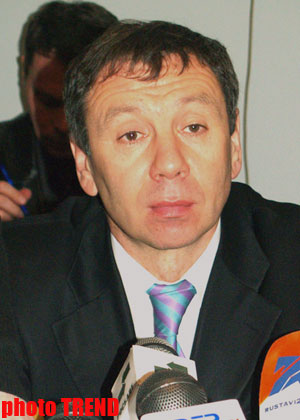Azerbaijan, Baku, Oct. 28 / Trend, E.Tariverdiyeva /
Talks on Nagorno-Karabakh resolution in Astrakhan yesterday [Oct. 27], like other similar meetings on this conflict, hardly can be called a step forward, but most importantly, they prevent backward steps, member of the Russian State Duma, Sergei Markov, believes.
"The question is neither about moving forward, nor stepping back. These meetings should help to understanding by the sides the logic to each other, and that's why they are important," Markov told Trend today in Baku.
Markov is attending a roundtable meeting "Parliament's role in development of civil society" in Baku, organized by the Institute for Eurasian Studies.
Astrakhan hosted the trilateral meeting of the presidents of Azerbaijan, Armenia and Russia - Ilham Aliyev, Dmitry Medvedev and Serzh Sargsyan Oct.27. The ways of resolving the Nagorno-Karabakh conflict were discussed there. The parties signed a declaration, which envisages the return of prisoners of war and takes a humanitarian nature, Medvedev said on Wednesday after the trilateral meeting.
According to Markov, the conflict sides and mediators do not have a road map to resolve the Nagorno-Karabakh problem and there are threats of destabilization of the situation in the region.
Azerbaijan enjoys advantage today, Markov, a Russian parliamentary representative to PACE, believes.
"The conflict on Nagorno-Karabakh was resolved in favor of Armenia by force. However, over 20 years the development progressed on such a way that the power balance constantly changed in favor of Azerbaijan," Markov said.
The conflict between the two South Caucasus countries began in 1988 when Armenia made territorial claims against Azerbaijan. Armenian armed forces have occupied 20 percent of Azerbaijan since 1992, including the Nagorno-Karabakh region and 7 surrounding districts.
Azerbaijan and Armenia signed a ceasefire agreement in 1994. The co-chairs of the OSCE Minsk Group - Russia, France, and the U.S. - are currently holding the peace negotiations.
Armenia has not yet implemented the U.N. Security Council's four resolutions on the liberation of the Nagorno-Karabakh and the surrounding regions.
According to Markov, in military and economic terms Azerbaijan has become much stronger than Armenia, but military resolution of the Nagorno-Karabakh conflict can undermine the progress achieved in economic development.
"Azerbaijan's present image thanks to the country's leadership is the image of a secure place for investments and the situation should not change," Markov said.






